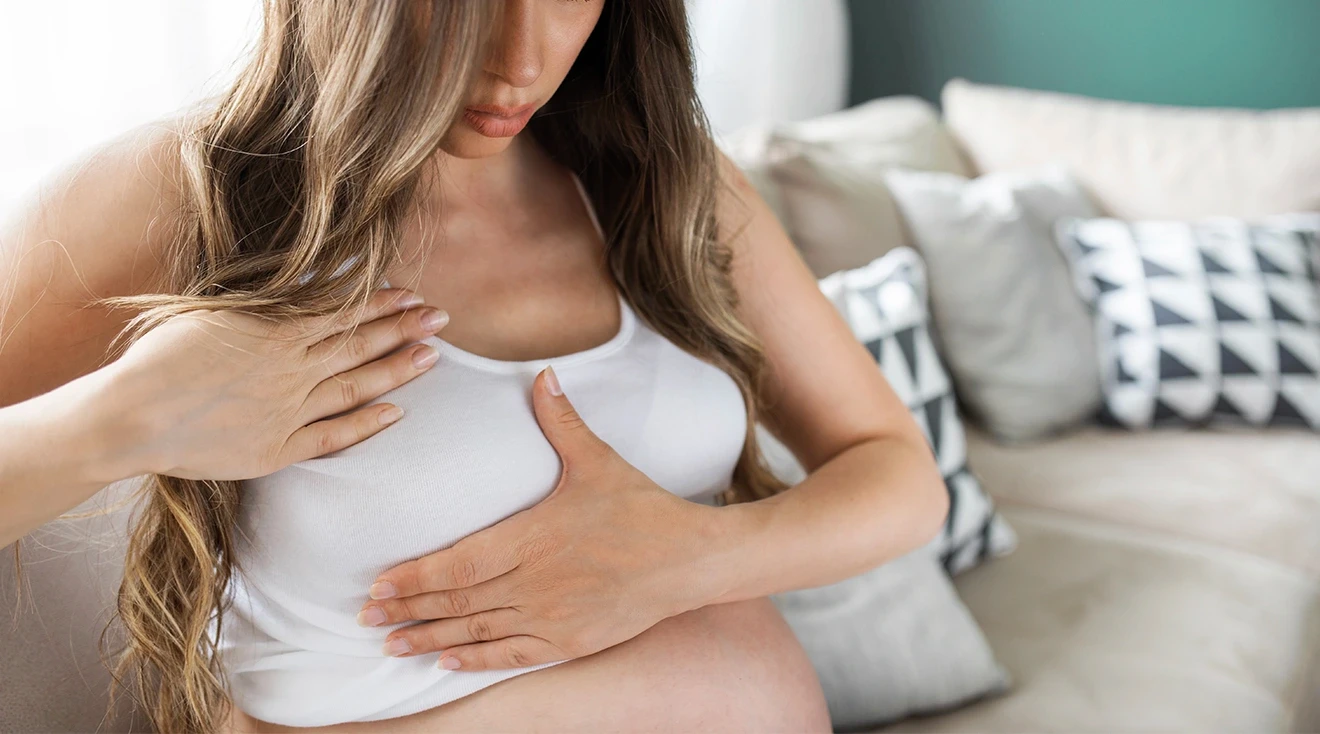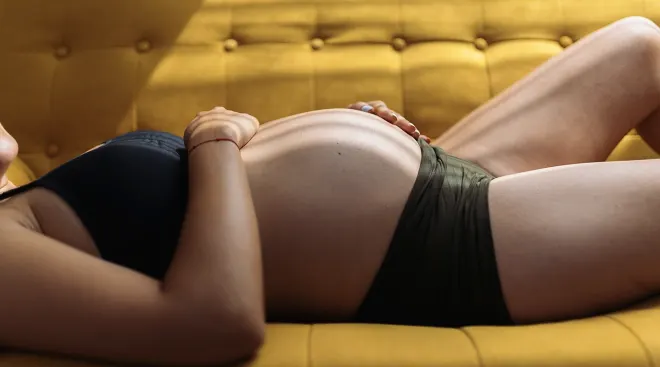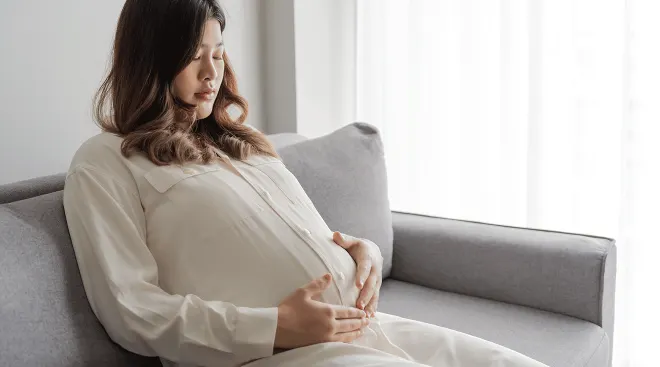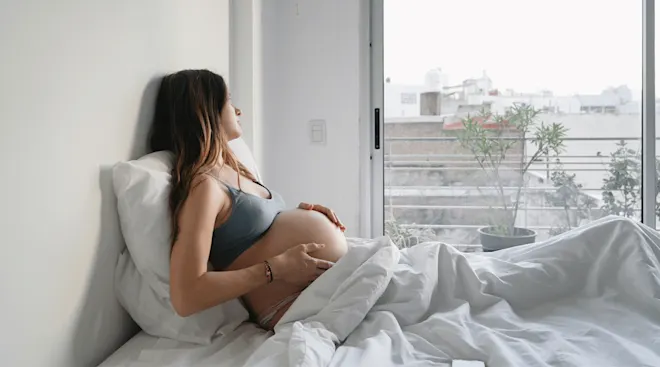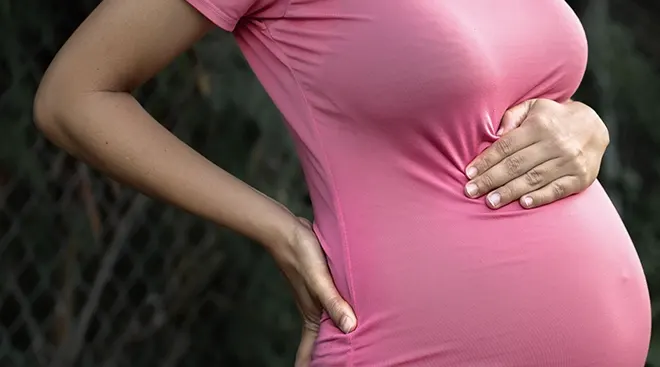When Does Breast Tenderness Stop in Pregnancy?
There’s a lot to navigate during pregnancy, from making plans to celebrate your upcoming bundle of joy to understanding changes that are happening in your body. One new symptom that can be confusing is breast tenderness, which can come on quickly and last for a while. You might also start worrying if it suddenly goes away—though, for the record, it’s generally not a cause for concern.
“Sore and tender breasts are a normal early sign of pregnancy—for many women, sometimes it’s the first sign,” says Jennifer Wider, MD, a women’s health expert, author and radio host.
If you’re dealing with especially sore breasts—or if your breasts have stopped hurting altogether—it’s understandable to wonder, When does breast tenderness stop in pregnancy? The answer’s a little complicated, but there’s a general timeline to help you figure out what to expect and when. Ahead, ob-gyns break it down.
It’s probably not shocking to hear that breast tenderness in pregnancy usually happens due to hormones. “Lots of hormones go up during pregnancy, and all can lead to breast discomfort,” says Mary Jane Minkin, MD, a clinical professor of obstetrics, gynecology and reproductive sciences at the Yale University School of Medicine. She specifically cites increases in estrogen and progesterone, as well as prolactin, which stimulates the breasts to get ready to produce milk for baby.
At the same time, “blood flow increases to the breasts, swelling the tissue and making it more sensitive,” Wider says.
Yes, breast tenderness can absolutely come and go in early pregnancy, says Christine Greves, MD, FACOG, an ob-gyn at the Winnie Palmer Hospital for Women & Babies in Orlando. “It just depends on the person’s body.”
Minkin agrees. “Levels can vary—so women shouldn’t get anxious about tenderness going away,” she says. “Some women do maintain tenderness throughout the pregnancy, some don’t.”
That heavy feeling in your boobs can start pretty early. “Breast tenderness can start as early as two weeks from the missed menstrual cycle,” says Meleen Chuang, MD, clinical associate professor of obstetrics and gynecology at the NYU Grossman School of Medicine and medical director at the NYU Langone Family Health Center. “This is often one of the first signs for many women that they feel pregnant. The [breasts] may feel sore, sensitive, tender, fuller and heavier.”
If your breast tenderness suddenly goes away, you might find yourself wondering: “My breasts have stopped hurting. Am I still pregnant?” When you’ve come to associate a symptom such as breast tenderness with your pregnancy and it vanishes, it’s understandable to feel a little nervous. But experts stress that diminished discomfort doesn’t necessarily mean anything bad.
“Fluctuations in hormone levels are normal in the first trimester, as are symptoms of breast pain and tenderness,” Chuang says. “Just as each woman experiences symptoms from the pregnancy hormones differently, every woman may experience these changes differently as well.”
Also keep in mind that breast tenderness is typically more severe during a first pregnancy than in subsequent pregnancies. “The breast glands and ducts are already established, so changes are not as dramatic as the first time,” Chuang explains.
While it’s unlikely, it’s possible that disappearing breast tenderness can signal a problem with your pregnancy—but you’re likely to have other symptoms along with it, Greves says. “It doesn’t mean the pregnancy is in jeopardy if you’re blessed with your breasts being less tender,” Greves says. Chuang says that spotting and pelvic cramping that come with loss of breast tenderness are more indicative of a potential issue—they should prompt a call to your doctor.
But if your breasts stop feeling tender and that’s the only difference you notice, Greves suggests bringing it up to your doctor anyway—it can’t hurt.
There’s some variation when it comes to when breast tenderness stops in pregnancy. If you have breast tenderness during your first trimester, it may diminish or go away during the second trimester, Chuang says. However, it could start up again in the third trimester as your breasts enlarge to prepare to make breast milk, she says. It might also just go away in the second trimester and not come back, Greves says—or you might never have it at all. (Lucky you!)
Keep in mind that breast tenderness can persist after baby is born. “It’s actually the delivery of the placenta and estrogen levels going down which triggers the milk coming in—and that can be uncomfortable,” Minkin says. If you’re not breastfeeding, your breasts might be engorged and uncomfortable for a little while, she adds.
If you’re breastfeeding, you’ll likely also notice engorgement from time to time, as well as tenderness if baby has an improper latch, Chuang says. (If you suspect baby’s latch is off, she recommends talking to a lactation consultant.)
Breast tenderness can vary a lot, and not everyone has it—or experiences it on the same level during pregnancy. “Each person is an individual,” Greves says. “Don’t be alarmed if you’re not like your best friend.”
Please note: The Bump and the materials and information it contains are not intended to, and do not constitute, medical or other health advice or diagnosis and should not be used as such. You should always consult with a qualified physician or health professional about your specific circumstances.
Plus, more from The Bump:
Meleen Chuang, MD, is a clinical associate professor of obstetrics and gynecology at the NYU Grossman School of Medicine and medical director at the NYU Langone Family Health Center. She earned her medical degree from Stony Brook University School of Medicine in Stony Brook, New York.
Christine Greves, MD, FACOG, is an ob-gyn at the Winnie Palmer Hospital for Women & Babies in Orlando. She earned her medical degree from the University of South Florida College of Medicine.
Mary Jane Minkin, MD, is a clinical professor of obstetrics, gynecology and reproductive sciences at the Yale University School of Medicine in New Haven, Connecticut. She has been in private practice for over 40 years. She earned her medical degree from Yale Medical School.
Jennifer Wider, MD, is a nationally renowned women’s health expert, author and radio host. She earned her medical degree from the Mount Sinai School of Medicine in New York City.
StatPearls, Physiology, Prolactin, January 2023
Learn how we ensure the accuracy of our content through our editorial and medical review process.
Navigate forward to interact with the calendar and select a date. Press the question mark key to get the keyboard shortcuts for changing dates.
































